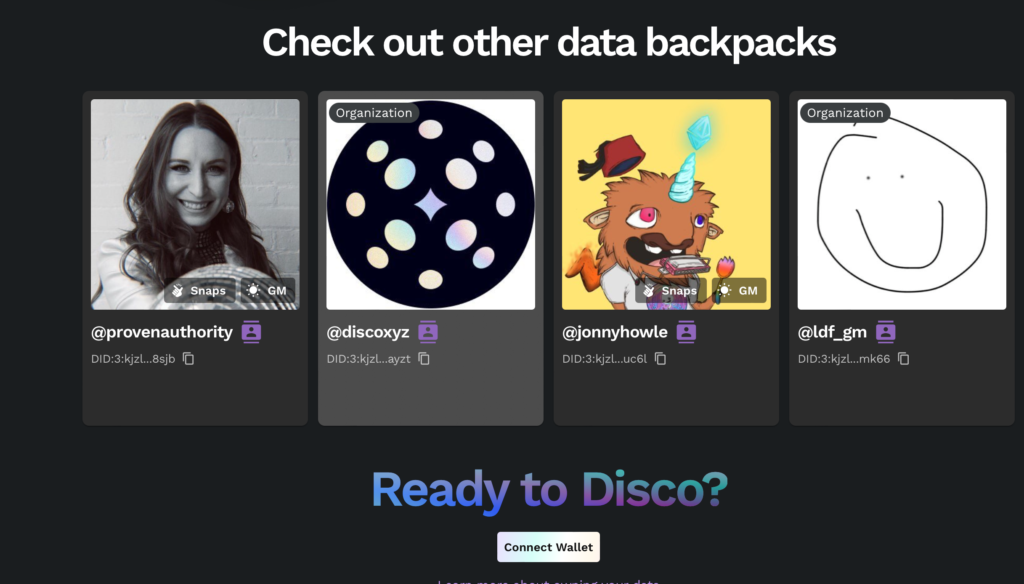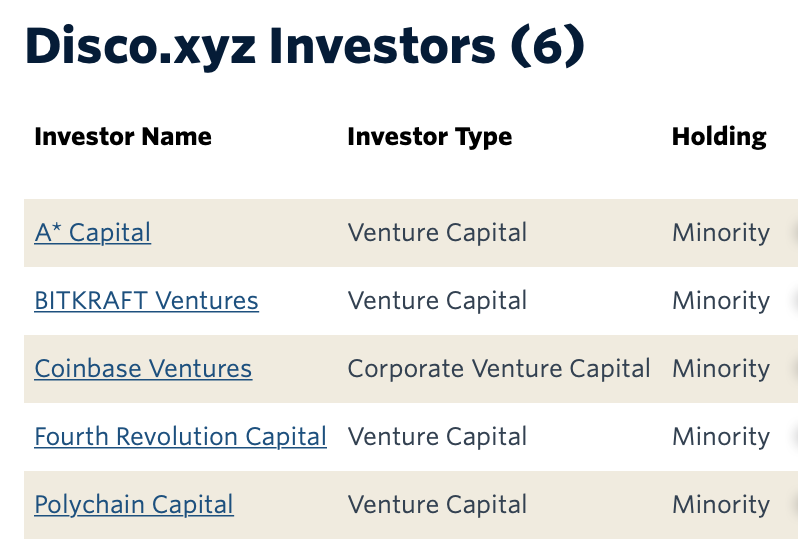Wonder how you can take ownership of your data into the Web3 future? Disco is your answer, it brings the party and the logistics for autonomously transferring your data to whoever you want, wherever you want, and whenever you want.
To explain the catalyst:
Web 3.0 was initiated to combat the extreme centralization we saw in Web 2.0 and combine it with the openness of Web 1.0. Web 1.0 was the introduction of static pages and URLs. As it modernized and became more user-friendly, flexible space for user-generated content materialized. Web 2.0 can be linked to the likes of Facebook, Twitter, and Tumblr. Following the user-generated content initiation came comment on content features. As it goes, monetizing this network effect ensued; mining users’ data and assigning value to each transaction or digital relevance crafts the web today.
Web 3.0 is the return to a more approachable and user-directed web. It is the user-orchestrated platform that will take the power back from the “man” and actually return it to the men. A.K.A. extract the monopolizing power facilitated by Web 2.0 and decentralize personal data.
The renowned Blockchain was created as a digital time-stamp for documents to facilitate safeguarded financial transactions during the economic crisis in 2009.
Web 3.0 took this innovation and expanded its scope.
In an effort to manage this re-decentralization of information and data, digital innovations have emerged. Namely – Disco – which as mentioned previously, brings the partyyyy.
Disco is broken down into 3 principles:
- Interoperability: The idea that you can manipulate your “chain” in all facets and allow one to introduce a portability aspect to your credentials.
- Privacy: You decide to whom you would like to share your information. PII “(Personal Identifiable Information) data is never committed to public blockchains.”
- Autonomy: As a customer, you retain your ownership of your information. You maintain key ownership and no central authority can refute this entitlement.
You are probably wondering… “Um, well then who owns my data now? I thought this was a natural given.” …Nar.
In the public web today, identifiable data is observed, controlled, and manipulated by “incumbents”, third-party companies. When you access the internet, in a sense, you are issuing a self-IPO. Every single aspect of your internet footprint is stored in data silos for companies to purchase. As a result, your web viewer page is “catered” to you by companies trying to poach your attention and money.
If this is off-putting to you, which I would expect for most, it would be… Disco offers the Disco Data Backpack. You can store and retrieve your personal information at the individual assertion, all through cryptographic proofs.
“It’s like going to a bar in the metaverse, and proving you are over 21, without having to show other aspects of your personal data like your address and DOB.”

Awesome! But, how is this done:
- Decentralized Identifiers (DIDs)
- It is an “alias” of pre-existing addresses (email, IP, Bitcoin, Ethereum, etc.)
- It is self-generated and owned. For example, one could name theirs: “did: ndei39f3hw”
- It is safeguarded through cryptography. Each wallet has an individual and unique DID, making it your own, the nontransferable key to any kingdom!
- Verifiable Credentials
- It is specially formatted data (JSON); digitized membership cards, IDs, account identifiers
- “Signed. In most cases, a verifiable credential is cryptographically signed by one DID about another DID. Because the credential is signed, it means nobody can tamper with it.”
- There is metadata-aligned proof of the title.
- “Is an open-source standard by the W3C Verifiable Credentials Data Model. It is a set of specifications and verifiable documentation that allow credentials to be verified and shared on the web.”
Who are the players:
- Issuer: governing body, institutional entity, organization
- Recipient: you
- Verifier: a separate entity that validates credentials
If you are feeling innovative (and froggy), sign up here.
Where is everything stored:
Disco currently uses the Ceramic network for storage. As it is in the Beta phase, it intends to layer storage elements with time.
Let’s form our own opinion.
These off-chain credentials can very much be owned by an individual and distributed upon each use case as proven by crypto. When I was first exposed to this digital innovation through the podcast, On the Other Side, I was captivated by the fluidity in usage. For example, one could use the “backpack” to get into concerts, optimizing the ID and ticket exchange. This would save time, and effort, and reduce loss. One other positive takeaway for me was that the iteration competition is popping; which means, this is a migration rather than a boom-bust bubble. Additionally, I really like the CEO’s message behind its inauguration – repurposing a technical, unsexy innovation for social and more relevant usage. Although in the Beta stage, I think the transparency and mission behind the innovation seem invest-worthy.
Here are the logistics:
HQ: NYC
Founded: 2022
CEO: Evin McMullen
Employees: 19
Investors: 6
Latest Deal Amount: $9 million

Additionally, I’ve provided a terminology toolkit, because this stuff is wackadoodle to comprehend.
Dictionary:
- Web 1.0 – used to describe the earliest form of the internet.
- Web 2.0 – refers to websites that emphasize user-generated content, ease of use, participatory culture, and interoperability for end users.
- Blockchain defined: Blockchain is a shared, immutable ledger that facilitates the process of recording transactions and tracking assets in a business network.
- Encryption: a way of scrambling data so that only authorized parties can understand the information.
- Decentralized Identifiers (DIDs) – These are like aliases for our existing addresses (Ethereum address, email address, website, Bitcoin address, etc.) that make it easy to prove ownership and control over other identifiers.
- DID Method – There a number of different ways to create DIDs (over 100 in fact!) but because different types of identifiers (like Ethereum addresses or Bitcoin addresses) work slightly differently and are rooted in different system we need a set of rules about how to create and interact with DIDs made out of the different identifiers. A DID Method is simply those rules!
- DID Document (DDO) – DIDs need DID Documents. A DID Document is a file that lists the current state of the DID as well as other public keys and endpoints for how to interact with that DID. The DID Document is where the magic of DIDs really happens!
- DID Communication Protocol (DIDComm) – This is a protocol that allows two DIDs to open a secure channel between them and send messages back and forth.
- Relying Party – is an individual or organization who relies upon data presented in a Verifiable Credential to inform app logic, unlock access to certain privileges, or other form of access enabled by data verification.
Citations: